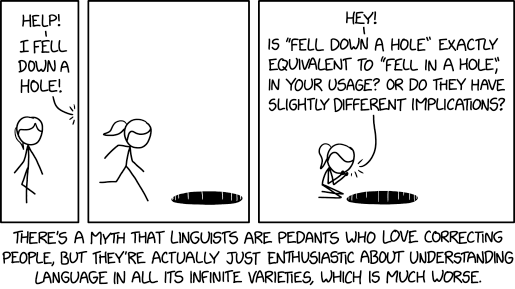this post was submitted on 04 Feb 2024
331 points (97.7% liked)
Linguistics Humor
1063 readers
170 users here now
Do you like languages and linguistics ? Here is for having fun about it
Share this community: [!linguistics_humor@sh.itjust.works](/c/linguistics_humor@sh.itjust.works)
Serious Linguistics community: !linguistics@mander.xyz
Rules:
- 1- Stay on Topic
Not about Linguistics, language, ways of communications - 2- No Racism/Violence
- 3- No Public Shaming
Shaming someone that could be identifiable/recognizable - 4- Avoid spam and duplicates
founded 1 year ago
MODERATORS
you are viewing a single comment's thread
view the rest of the comments
view the rest of the comments

If I were to rely on my "guts":
However I'm not a native speaker, and my L1 is rather relaxed when it comes to what prepositions convey. And from a quick websearch, Google lists 3.3M occurrences for "fell in a hole", 2.2M occurrences for "fell into a hole" and 820k for "fell down a hole"; that hints for me that, by default, speakers would use "in a hole" here, unlike I would.
I could say "I fell in a hole" to mean either case (I was in or out of the hole beforehand), but for "I fell into a hole" I would only use it when starting outside the hole. (native speaker)
Like on the one hand it could mean "I fell [while I was] in the hole"
But it could also mean "I fell [and then I was] in the hole"
I am a native speaker, and I do take my word choices very seriously - often to the point of pausing during conversations to find the exact phrasing which will convey the shade of meaning I am looking to convey. I wrote fiction for a while, and it was always extremely important to me to get phrasing right.
I agree with you completely. While I would interpret all of those phrases as equivalent (based on context) if they were to come from someone else, I would tend to use them in exactly the ways you suggest.